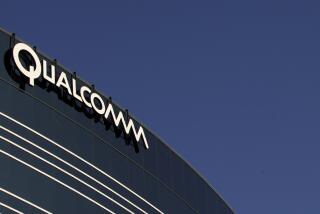Suit May Stunt Wireless Market, Lawyer Says
- Share via
Verizon Wireless said Thursday that a complaint by chip maker Broadcom Corp. against Qualcomm Inc. might damage growth in the handset industry in the next four years.
Sales of phones containing chips disputed by Broadcom amounted to $1.3 billion last year and are expected to rise substantially in the next four years, Verizon Wireless lawyer Mark Hansen said on the first day of a trial before the U.S. International Trade Commission.
“Is it a fair cost-benefit trade-off to cause $1.3 billion in harm to innocent third parties to secure $5 million to $11 million in royalties to a patent owner?” Hansen asked Carla Mulhern, an economist hired by Broadcom.
Claiming patent infringement, Irvine-based Broadcom wants the U.S. to ban handsets with certain Qualcomm chipsets that permit fast Internet access. Verizon Wireless, Sprint Nextel Corp. and other mobile phone companies that use San Diego-based Qualcomm’s technology are fighting Broadcom’s complaint.
Mulhern disputed Hansen’s estimate of Broadcom’s potential royalty rate and said he overstated the harm to phone companies.
Any damage to their business was outweighed by a patent owner’s right to control the use of an invention, she said. The sales in question wouldn’t all be lost anyway, because consumers would just buy different types of phones, Mulhern said.
Broadcom, best-known for making the chips inside cable set-top boxes, is trying to expand into making chips for the largest cellphone makers.
Broadcom claims that the move is being impeded by Qualcomm, the world’s second-largest maker of cellphone chips, behind Texas Instruments Inc.
Broadcom and Qualcomm have filed at least six lawsuits against each other in the last year.
Broadcom in October joined five companies, including Finland-based Nokia Corp., the world’s largest handset maker, in a complaint before the European Commission that said Qualcomm was charging excessive royalties.
Administrative Law Judge Charles E. Bullock of the trade commission heard testimony in February and March over whether the Qualcomm chips infringe Qualcomm patents.
The four-day trial that began Thursday concerns what action should be taken if infringement is found. Bullock is scheduled to submit his recommendations to the commission next month.
Besides Verizon Wireless and Sprint Nextel, companies taking Qualcomm’s side include phone manufacturers LG Electronics Inc., Motorola Inc., Samsung Electronics Co. and Kyocera Corp.’s wireless unit.
They have argued that they shouldn’t be punished even if the Qualcomm chips do infringe Broadcom’s patents.
Broadcom contends that any handsets with Qualcomm chips known as EV-DO, or evolution data only, that provide high-speed Internet access or video should be banned.
Shares of Broadcom fell 72 cents to $29.13. Qualcomm shares rose 30 cents to $38.47.






